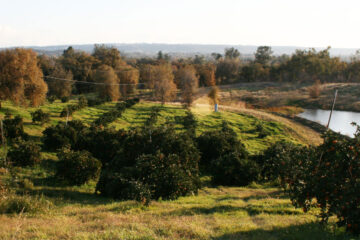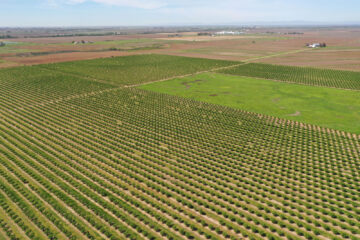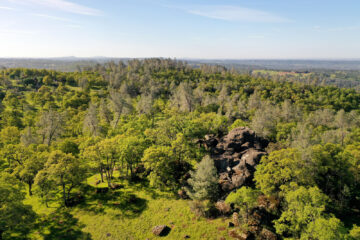Quick Facts:
- 427 acres along Doty Ravine northeast of Lincoln.
- Vernal Pool Grassland and Riparian Habitat
- Protected since April 2005 through Placer Land Trust’s West Placer Habitat Protection Program
- Doty Ravine Preserve supports multiple on-going restoration projects
- Adaptive management through rotational livestock grazing
In 2022, Doty Ravine Preserve was renamed “Weygandt Doty Ravine Preserve” to honor retiring Placer County District 2 Supervisor Robert Weygandt for his years of service and land conservation achievements in our county. Read more here.
Restoration Through Managed Grazing
Native Grass Re-Population
As a part of our Adaptive Management Plan, Placer Land Trust works with local grazier Dan Macon, of Flying Mule Farms, to impact non-native and invasive grassland plant species and reduced fuel loads to reduce the risk of catastrophic fires. Livestock graze on invasive plant species, reducing seed populations, keeping fuel loads down, and making room for native species. Hooves are beneficial to incorporating native grass seed, saving money and helping the environment by reducing tillage, which disturbs soil structure and contributes to air pollution. These livestock are a boost to the local economy by providing income for local ranchers and providing Placer County locals with healthy grass-fed lamb and beef.
Vernal Pool Improvement
Reducing invasive weeds and increasing native plants improves the soil, increases forage for both livestock and native wildlife, and can increase the overall health of vernal pools, which provide critical habitat for endangered fairy shrimp.
Floral Survey
Annual floral surveys help Placer Land Trust monitor the use of livestock as a grassland management tool.
2009 Upland Grassland Survey Report
Nesting Box Installation
Placer Land Trust installed nesting boxes for native bird species including western bluebirds, wood ducks, American kestrels, and ash-throated flycatchers. The Bluebird nesting boxes were obtained through a donation by the Sierra Foothills Audubon Society, and others were built by Girl Scout Troop #1319 with leadership and monitoring for the 2010 nesting season provided by girl scout cadet Megan Forester.
During the winter of 2010, wood duck nesting boxes were provided and installed by Lincoln High School students in a collaborative effort between Placer Land Trust, Lincoln High School, Sierra College, and the Sportsman’s Legacy Foundation. This program offers scholarships to graduating high school students participating in the project and who will be enrolling at Sierra College.
Riparian Restoration
Keeping livestock out of sensitive riparian areas and re-planting degraded areas with native plants protects the health of these rich ecosystems. In the fall of 2008, Westervelt Ecological Services and High Ranch Nursery planted over 5,000 California native trees and shrubs in a 20-acre restoration site located along Doty Ravine.
Doty Ravine Preserve is not open to the public. For a list of our properties that have public trails visit our Trails page.
















